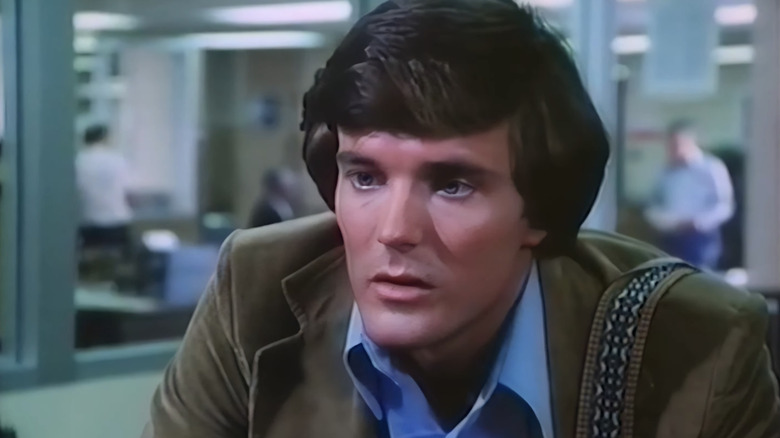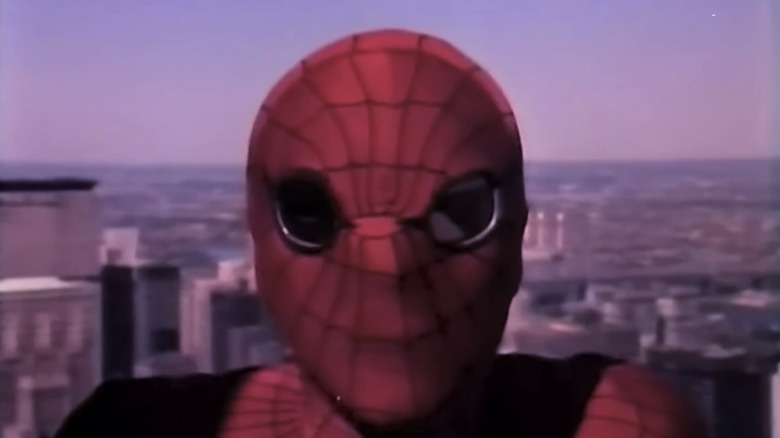Why Stan Lee Despised Marvel's 1970s Live-Action Spider-Man Series
We may receive a commission on purchases made from links.
Not only has Spider-Man long since proven his worth as one of the best comic book characters of all time, he's also transcended the genre to become a pop culture legend. Like most characters of that magnitude, the web-slinger lends himself to constant reinterpretation, as evidenced by the multitude of films and TV shows that have imagined and reimagined the character over the years. One particular forgotten live-action interpretation of Spider-Man, however, didn't go down well with his co-creator Stan Lee, who found this particular take on his material to be "juvenile" and unfaithful to his original vision.
In September 1977, CBS debuted its "The Amazing Spider-Man" live-action series and seemed to have a hit on its hands. The show was a ratings success but proved to be short-lived and completely failed to gain Lee's support. In a 2004 interview with the Television Academy, Lee explained that he was "very unhappy" with the series, adding, "Very often, people will take a novel, let's say, and bring it to the screen [...] and they will leave out the one element, the one quality that made the novel a best-seller." Evidently, Lee — who passed away in 2018 at the age of 95 — saw that exact problem occur with "The Amazing Spider-Man," with the comic book legend adding, "I felt the people who did the live-action series left out the very elements that made the comic book popular."
What were those elements? Well, if anyone should know, it's Lee, seeing as he made sure to imbue his own tales of the web-slinger with humanity and humor — both of which he felt were absent from the CBS series. "They left out the humor," he clarified. "They left out the human interest and personality and playing up characterizations and personal problems."
Stan Lee hated the 1970s Spider-Man show before it even aired
"The Amazing Spider-Man" debuted the same year that The Electric Company's "Spidey Super Stories" — the first live-action iteration of the Spider-Man character — ended. While the show was airing, Stan Lee elected to sell the rights to a live-action primetime Spider-Man series to CBS and executive producer Daniel R. Goodman. Along with producer Charles Fries, Goodman developed the live-action Spidey project into a two-hour pilot starring Nicholas Hammond as Peter Parker/Spider-Man. The pilot played well on CBS, prompting the network to order five episodes.
But getting to that point proved tricky. According to "Science Fiction Television Series" by authors Mark Phillips and Frank Garcia, Goodman had a meeting with Lee during which the Spider-Man creator complained that the show had veered too far from the original comic books. Goodman, however, had done so intentionally. "My concept was to make Spider-Man more acceptable to a general audience than just to kiddies," he explained, "and perhaps there was a clash of ideologies. We had to compromise as CBS was sold on my original sales presentation of a prime-time general audience show."
Lee clearly wasn't too happy with that compromise, though, and wasn't above saying as much in public or even in the pages of Marvel's own publications. In a 1978 interview for Marvel's Pizzazz magazine, the writer described "The Amazing Spider-Man" as "too juvenile," and he lambasted the show again in a separate interview for The Atlanta Constitution in 1978 (via writer Bill King's own website). "The whole appeal of the character is the contrast and conflict between his private life as Peter Parker and his life as Spider-Man," Lee noted. "The comic book version is more adult and sophisticated than the TV version."
There was a lot wrong with The Amazing Spider-Man
Clearly, Stan Lee's thoughts on "The Amazing Spider-Man" didn't change, as he was just as upset about the show in 2004 as he was while it was still on the air. Luckily for him, the series didn't actually last that long and was canceled in 1979 after just 13 episodes (despite having fared well in the ratings). At one point, there were even ambitions to do an "Amazing Spider-Man" and "The Incredible Hulk" crossover film, but that ultimately didn't happen.
There were a number of things holding "The Amazing Spider-Man" back that had nothing to do with Lee's criticisms. Like the beloved "Batman" series of the 1960s, "The Amazing Spider-Man" was mostly filmed in Los Angeles, despite the fact it was supposed to take place in Peter Parker's native New York City. As such, the show was at a major disadvantage from the outset, as NYC is surely as big a part of the Spidey formula as Gotham is for the Dark Knight. The series' budget and the fact that shows like "The Six Million Dollar Man" were popular meant Spider-Man's famous rogues were also off the table, so Nicholas Hammond's Spider-Man did battle with the likes of a businessman named Mr. White and a corrupt politician instead.
Still, during his Television Academy interview, Lee did admit that he liked at least this one aspect of the show. "On a technical level, I think they did a good job," he said. "The scenes of [Spider-Man] climbing on the wall — in those days, they didn't have the wherewithal that they have today, and they did a very good job with that." Otherwise, Lee wasn't a fan.


